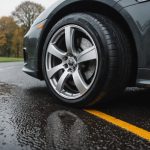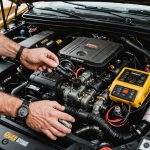Handling Driving in Extreme Weather
When facing extreme weather conditions, understanding how to adapt your driving can be crucial for safety. In heavy rain, for instance, slowing down and increasing the distance between you and the car ahead can significantly improve your ability to stop safely. This prevents hydroplaning, a common issue when the tyres lose contact with the wet road surface.
Driving tips for snowy conditions include ensuring that your car is equipped with winter tyres, which offer better grip than standard ones. Also, be gentle with the accelerator, brakes, and steering to avoid skids. A common error during snowy conditions is attempting to stop suddenly, which can cause a vehicle to skid.
Also read : Ultimate handbook for enhancing your british family estate car”s suspension for peak performance
Adapting to heat is equally important in the UK, where cars are less accustomed to extreme temperatures. Overheating can be avoided by maintaining your car’s coolant levels and ensuring the cooling system is functioning correctly. Always carry an emergency kit designed for the specific weather challenges of your journey, including items like warm clothing, water, and a flashlight for sudden weather changes.
Preparation and situational awareness can greatly mitigate the risks associated with driving in unpredictable British weather.
Topic to read : Key factors to keep in mind when selecting all-weather floor mats for your family vehicle in the uk
Overview of Extreme Weather Challenges for British Cars
Navigating the unique weather challenges in the UK presents significant hurdles for British cars. Rain, snow, and heat each affect vehicles differently, demanding tailored strategies for adaptation. Rain, for instance, can lead to hydroplaning, impacting tyre grip on wet roads. Understanding how to manage these risks is crucial.
In snowy conditions, vehicles face potential skidding. Winter tyres offer a critical advantage, providing better grip and control, compared to all-season tyres. Meanwhile, UK cars often struggle with heat due to typically mild weather, leading to overheating risks. Ensuring your car’s cooling system, including antifreeze, is functioning optimally mitigates such dangers.
Common issues British car owners encounter include weather-related wear on wipers, brakes, and tyres. These components can deteriorate rapidly under extreme conditions, signalling the necessity for regular maintenance. Seasonal checks for each element are important to identify early signs of wear and tear.
Preparation is fundamental not only for vehicle longevity but also to enhance safety. By taking proactive steps, such as equipping appropriate products and keeping essential gear handy, car owners can navigate unexpected weather changes more confidently and reduce unforeseen breakdowns. Adapting to these varying conditions is paramount for the proper functioning of a vehicle.
Key Maintenance Strategies for Different Weather Conditions
Vehicle maintenance is crucial when dealing with the UK’s unpredictable weather. Every season brings distinct challenges, necessitating tailored weather preparations.
In winter, ensure your tyres are equipped to handle slippery surfaces. Regular inspections for tread depth and pressure are vital. Meanwhile, checking wipers for cracks or stiffness is essential as they often deteriorate in cold weather.
Summer demands attention to fluid levels and cooling systems to prevent overheating. A thorough seasonal check of brakes, which endure high wear in fluctuating conditions, supports better vehicle control.
Essential tools for maintenance include a pressure gauge for tyres, ensuring optimal performance year-round. A quality scraper and de-icer will keep your windshield clear in frost. For summer, invest in a coolant tester to prevent overheating.
Regular care of your car’s exterior to remove corrosive elements like road salt is equally critical. This protects against rust, prolonging the life of your vehicle.
Keeping an eye on all these weather-related elements helps to maintain your car’s longevity, offering peace of mind no matter the season.
Essential Products for Weather Preparedness
Equipping your car with appropriate gear is crucial to cope with the UK’s erratic weather. The effectiveness of your vehicle’s performance heavily relies on the quality and relevance of products such as antifreeze, tyres, and wipers.
Antifreeze and Coolant
Maintaining the right coolant levels is vital, especially during extreme weather conditions. When selecting antifreeze, choose one compatible with your vehicle’s make. Typically, a mix with a higher glycol-to-water ratio is suited for colder temperatures. Replace your coolant based on your car manufacturer’s recommendations, usually every 30,000 miles, to avoid overheating.
Tires for All Seasons
Choosing suitable tyres is crucial for navigating rain, snow, and heat. Winter tyres offer enhanced traction in snow and ice, while all-season tyres provide a balanced performance year-round. Routine maintenance—like checking tyre pressure and tread depth—ensures safety and performance across various climates.
Windshield Wipers and Visibility
High-quality wipers are indispensable for maintaining visibility in adverse conditions. Look for silicone or coated wipers for enhanced durability against rain and snow. Usually, replacing wipers every six months or when streaks appear ensures optimal performance, safeguarding your view through the windshield.
Common Mistakes to Avoid in Weather Preparation
Navigating the UK’s unpredictable weather poses unique preparation mistakes for car owners. Many drivers neglect basic maintenance checks, assuming their vehicles can withstand extreme conditions unscathed. Ensuring regular tire, wiper, and brake inspections can prevent failures during critical weather challenges.
Utilising subpar products for weather protection is another common pitfall. For instance, inappropriately rated antifreeze can lead to cooling system malfunctions in severe cold or heat. Select products designed for your vehicle and tailored to British weather, enhancing performance and longevity.
Driver readiness and skills are often overlooked. It’s essential to practice adjusting your driving habits to match different climates. Simple adjustments, like increasing following distances in rain or snow, can significantly improve safety. Preparing for unexpected weather shifts by updating your driving skills is vital for adapting to changing road conditions.
Remember, thorough British car preparation isn’t just about your vehicle. It’s about combining the appropriate weather-related gear with enhanced driver skills. By addressing these preparation errors, you’ll boost safety, protect your vehicle, and confidently tackle the UK’s erratic weather.
Expert Opinions and Personal Anecdotes
Gaining insights from automotive experts can be invaluable when dealing with Britain’s unpredictable weather. These professionals often emphasise that simply purchasing weather gear isn’t enough—it must be meticulously matched with your specific vehicle’s requirements. In numerous cases, experts stress the necessity of regular maintenance checks and quality products, which prevent common breakdowns in adverse conditions.
Personal experiences from car owners further underscore the importance of British car preparation. Many recount finding themselves in hairy situations where key maintenance errors—like neglecting to check coolant levels—led to overheating. Reflecting on these incidents helps inform better future practices and highlights the real-world impact of thorough preparation.
Stories often reflect unanimous lessons learned: overlooking the signs of wear and ignoring expert advice can result in significant inconvenience and expense. One driver recalled a near-accident in icy conditions due to worn brake pads, vividly illustrating the critical nature of weather-related gear. Another cited the relief of having functional wipers during a sudden snowstorm, which made their commute safer and more manageable.
Encompassing both professional recommendations and personal anecdotes creates a comprehensive guide to navigating the extreme conditions faced on UK roads.











